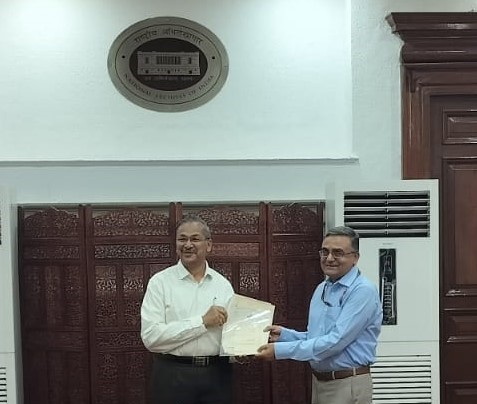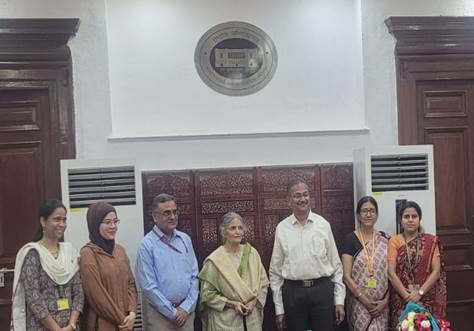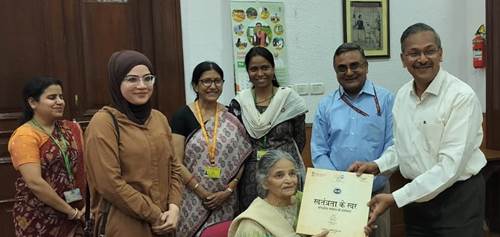National Archives of India Acquires the private paper collection of Late Rafi Ahmad Kidwai
National Archives of India (NAI) has acquired the private paper collection of Late Shri Rafi Ahmad Kidwai, comprising original correspondences of Shri Kidwai with other eminent leaders like Pt. Nehru, Sardar Patel, Shyama Prasad Mukherjee, P.D. Tandon etc. These papers were handed over to D.G. NAI by Shri Faiz Ahmad Kidwai (IAS), Additional Secretary, Ministry of Agriculture and Farmers Welfare, in the presence of Smt. Tazeen Kidwai, daughter of Late Shri Hussain Kamil Kidwai, youngest brother Shri Rafi Ahmad Kidwai and Ms. Sarah Manaal Kidwai.

National Archives of India is the custodian of the non-current records of the Government of India and holds them in trust for the use of administrators and researchers as per the provision of Public Record Act 1993. As a premier archival Institution, National Archives of India plays a key role in guiding and shaping archival consciousness. Apart from the vast collection of public records, NAI has a rich and ever-growing collection of private papers of eminent Indians from all walks of life, who have made significant contributions to our nation.

Shri Rafi Ahmad Kidwai was a man of vivacity, brilliance and charm who is known for his ceaseless efforts towards Independence of our country and for refuting communalism and superstitions of every type. Born on February 18, 1894, in Masauli, Uttar Pradesh, he hailed from a middle-class zamindar family. His political journey began in 1920 with his involvement in the Khilafat Movement and the Non-Cooperation Movement, leading to imprisonment. Kidwai served as the Private Secretary to Motilal Nehru and later held significant positions in the Congress Legislative Assembly and the United Provinces Congress Committee. His political acumen led him to become a Minister in Pandit Govind Ballabh Pant’s cabinet, where he managed Revenue and Jail portfolios. Post-independence, he served as India’s first Minister for Communications in Jawaharlal Nehru’s cabinet, launching initiatives like the “own your telephone” service and night air mail. In 1952, he took charge of the Food and Agriculture portfolio, successfully tackling food rationing challenges with his administrative skills.

Kidwai’s dedication to liberating India and strengthening the nation remained unwavering throughout his political career. His contributions were recognized with the creation of the Rafi Ahmed Kidwai Award by the Indian Council of Agricultural Research in 1956. Kidwai’s tenure as Communication Minister earned him a reputation for innovation and effectiveness, while his leadership in the Food Ministry was hailed as a triumph over adversity, earning him the moniker of a magician and a miracle man. Rafi Ahmed Kidwai indeed embodied action and dedication in his pursuit of Indian independence and later in his administrative roles. His ability to swiftly address crises and implement innovative solutions highlights his remarkable leadership qualities. His contributions to various sectors, from communications to agriculture, left a lasting impact on the nation’s development. His legacy as a committed freedom fighter and a skilled administrator continues to inspire generations.

